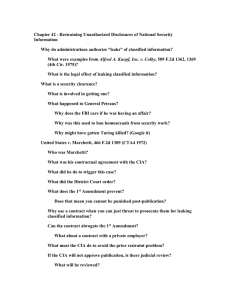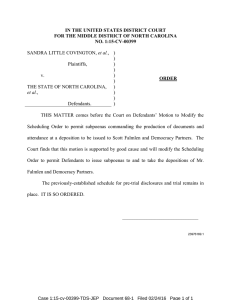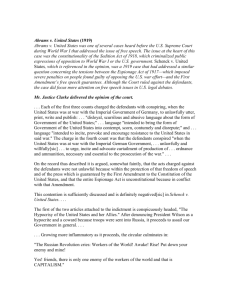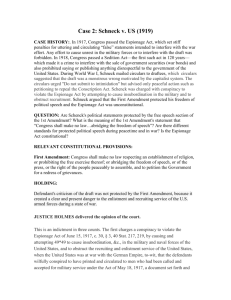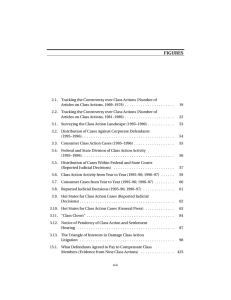Remainder of the study question for Chapter 42.
advertisement
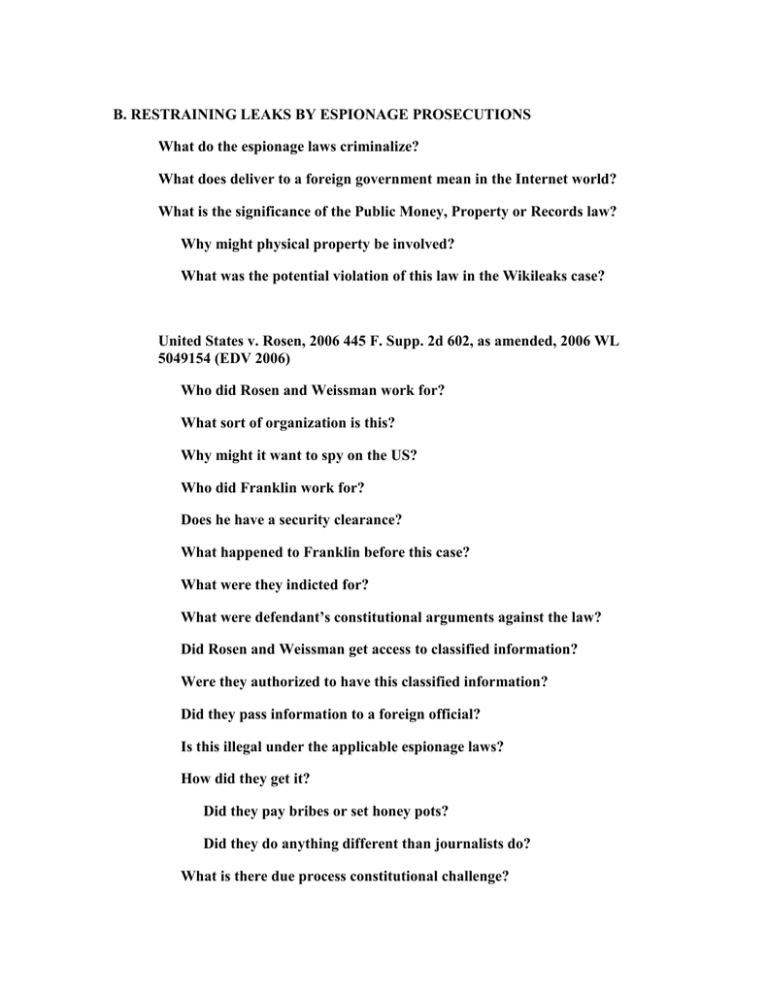
B. RESTRAINING LEAKS BY ESPIONAGE PROSECUTIONS What do the espionage laws criminalize? What does deliver to a foreign government mean in the Internet world? What is the significance of the Public Money, Property or Records law? Why might physical property be involved? What was the potential violation of this law in the Wikileaks case? United States v. Rosen, 2006 445 F. Supp. 2d 602, as amended, 2006 WL 5049154 (EDV 2006) Who did Rosen and Weissman work for? What sort of organization is this? Why might it want to spy on the US? Who did Franklin work for? Does he have a security clearance? What happened to Franklin before this case? What were they indicted for? What were defendant’s constitutional arguments against the law? Did Rosen and Weissman get access to classified information? Were they authorized to have this classified information? Did they pass information to a foreign official? Is this illegal under the applicable espionage laws? How did they get it? Did they pay bribes or set honey pots? Did they do anything different than journalists do? What is there due process constitutional challenge? Why do they say the statutes are vague? What is the intent requirement? Why does this eliminate the vagueness issue? What is defendants’ novelty argument? Is this a version of the one bite rule from dog law? Why doesn’t the court buy the one bite rule? What does the court think about argument that the law is not intended to punish leaks? What does United States v. Morison, 604 F. Supp. 655, appeal dismissed, 774 F.2d 1156 (4th Cir. 1985) tell us about the theory that not using the law means that it does not apply. What was the defendant’s first amendment argument in this case? What is the government position on 1st Amendment issues and espionage laws? What dos Mills v. Alabama, 384 U.S. 214, 218 (1966) tell us about 1st Amendment policy? What does this court say about whether secrets can still get 1st Amendment protections? So, we get a balancing test between the 1st Amendment and nation security. What goes on the defendants’ side of the scale from the Pentagon Papers case? How does the government claim that these secrets are different from those in the Pentagon Papers case? What is the “the appearance of confidentiality so essential to the effective operation of our foreign intelligence service”? How does the court decide if §793 is a chainsaw or a scalpel? – The court says that this narrows the scope of 739: “...the first clause of §793(e) implicates only the defendants’ right to disclose, willfully, information the government has sought to keep confidential due to the potential harm its disclosure poses to the national security in situations in which the defendants have reason to believe that such disclosure could be used to injure the United States or aid a foreign government.” When reporters publish information, is it willful? Who decides if it is harmful? Will the government admit that it is not harmful? Does this really narrow 739? Why is no question that government employees entrusted with classified information have no 1st Amendment right to disclose it? Is this really a 1st Amendment issue? What is the difference between government as regulator and government as employer? How are these defendants different from Morison, Marchetti or Snepp? What is defendants “holder in due course” notion of the limits of espionage acts? Why does the very wording of the court’s statement of this position tell you that defendants are about to lose? What is the court’s traditional slam dunk you lose example? Are defendant charged with this sort of violation? What does the court tell us about the potential for prosecuting the New York Times for publishing the Pentagon Papers? How does this undermine the defendants claim that espionage acts do not reach reporters? What is the real scienter limitation? So what will the government have to prove about defendants’ state of mind as an element of the prosecution? Will this be what these defendants believed, or what a reasonable defendant would have believed? What does this matter? What do most whistle blowers believe? What would you expect these defendants to believe if they are acting as Israeli spies? Were defendants eventually prosecuted? Think the result might have been different if they had been working for the Russian lobby Notes What was Morison prosecuted for selling? Who did he sell it to? Was he accused of being a spy? How can the government bully reporters into giving up leakers? Why do some people think the reporter was happy to go to jail in this case? Do you think the defendants fairly claimed surprise because, with the single exception of Morison, the Espionage Act had never been applied except in ‘‘classic espionage cases’’? What would you have told them if you were their lawyer? National Defense Information was originally defined in times of traditional war, so it referred to things like troop movements. How does modern asymmetric warfare make this definition less useful? Why is NDI a much broader notion today? Does this undermine the argument that 739 deals with a narrow slice of information? Does the espionage act punish just having unauthorized access to classified documents? Is there evidence on whether congress historically meant to punish leaks published by reporters? Do you think this applies to the 9/11 Congress? Should motive matter? How is leaking theft? What is the fiduciary duty law on employees leaking or selling employer confidential information?
